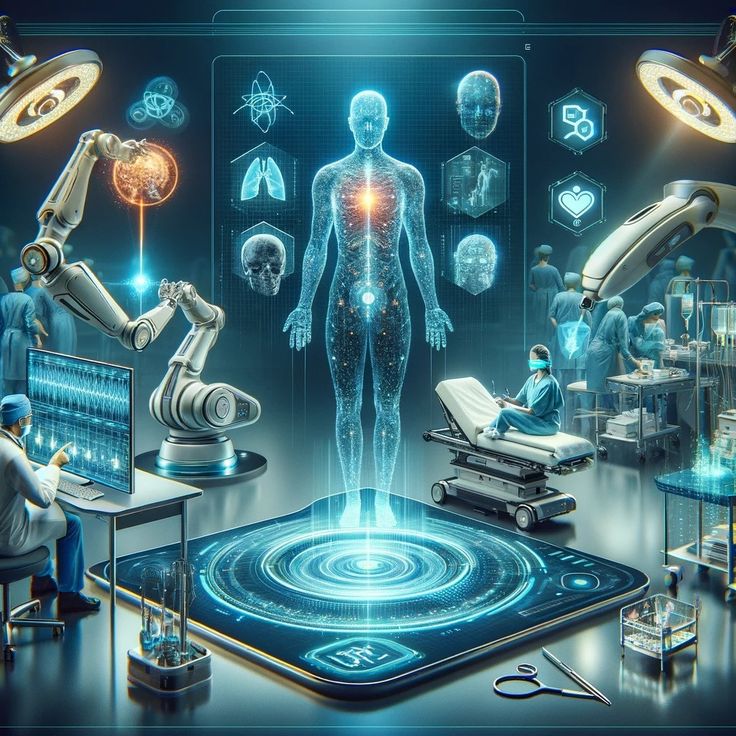
Healthcare
Unlocking the Potential: The Impact of AI in Healthcare
In recent years, Artificial Intelligence (AI) has emerged as a transformative force across various industries, and healthcare is no exception. The integration of AI technologies into healthcare systems has revolutionized the way medical professionals deliver care, diagnose diseases, manage patient data, and conduct research. From improving efficiency to enhancing patient outcomes, the positive impact of AI in the healthcare sector is vast and continues to expand.
One of the most significant contributions of AI to healthcare is in the realm of diagnostics. Advanced machine learning algorithms can analyze vast amounts of medical data, including imaging scans, genetic information, and patient records, with remarkable speed and accuracy. This capability enables early detection of diseases such as cancer, heart conditions, and neurological disorders, leading to timely interventions and improved treatment outcomes. Moreover, AI-powered diagnostic tools can assist healthcare providers in making more informed clinical decisions, reducing diagnostic errors, and ultimately saving lives.
Furthermore, AI holds immense potential in personalized medicine, where treatments are tailored to individual patients based on their unique genetic makeup, lifestyle factors, and medical history. By analyzing complex datasets, AI algorithms can identify patterns and correlations that help predict how a particular patient will respond to a specific treatment. This precision medicine approach not only enhances the efficacy of treatments but also minimizes adverse effects, optimizing patient care and quality of life.
In addition to diagnosis and treatment, AI is revolutionizing healthcare delivery and management. Virtual health assistants powered by natural language processing (NLP) algorithms are becoming increasingly prevalent, providing patients with personalized health information, appointment scheduling, medication reminders, and even remote monitoring of vital signs. These AI-driven virtual assistants improve patient engagement, accessibility to healthcare services, and adherence to treatment plans, leading to better health outcomes and reduced healthcare costs.
Moreover, AI has transformed healthcare operations by streamlining administrative tasks, optimizing resource allocation, and enhancing workflow efficiency. Predictive analytics models powered by AI can forecast patient influxes, identify potential bottlenecks in hospital operations, and allocate resources accordingly, ensuring timely and effective patient care. Additionally, AI-enabled electronic health record (EHR) systems automate data entry, documentation, and retrieval, reducing administrative burden on healthcare providers and allowing them to focus more on patient care.
Another area where AI is making significant strides is in medical research and drug discovery. AI algorithms can analyze vast datasets of biological and chemical information to identify potential drug candidates, predict their efficacy and safety profiles, and accelerate the drug development process. By expediting the discovery of novel therapeutics, AI has the potential to address unmet medical needs, combat emerging infectious diseases, and improve global public health.
Furthermore, AI-driven predictive analytics models are revolutionizing public health surveillance and disease outbreak detection. By analyzing real-time data from various sources, including social media, search engines, and wearable devices, AI algorithms can identify disease trends, monitor population health indicators, and detect potential outbreaks early on. This proactive approach enables public health authorities to implement timely interventions, contain the spread of infectious diseases, and protect communities from health threats.
In conclusion, the integration of AI into the healthcare sector has brought about unprecedented advancements, revolutionizing patient care, medical research, and healthcare management. From early disease detection to personalized treatment approaches, AI-powered technologies are enhancing the efficiency, accuracy, and accessibility of healthcare services, ultimately improving patient outcomes and saving lives. As AI continues to evolve and innovate, its positive impact on healthcare is poised to grow, ushering in a new era of precision medicine, preventive care, and global health equity.
How will AI Care will help better your field

